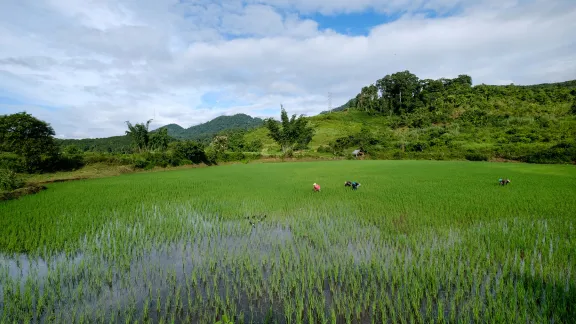
Farmers remove weeds in a Laos rice field. In most Asian countries, rice is both a main staple and a principal livelihood. Photo: Thomas Lohnes
Producing more with less labor and less water
(LWI) - The Lutheran World Federation (LWF) is promoting long-term resilience in Myanmar by teaching farmers in the Kayin State new rice planting techniques that produces more rice with less labor and less water.
This innovative method, called the System of Rice Intensification (SRI) has helped rice farmers increase production, improve the quality of seedlings and implement more sustainable practices.
Despite the current conflict in Myanmar, farmers in less affected areas continue to strive towards creating opportunities for sustainable livelihoods. According to the Myanmar Humanitarian Response Plan 2022 issued by the United Nations Office for the Coordination of Humanitarian Affairs, over 14,4 Million people are in need of humanitarian assistance with 6,2 million requiring urgent lifesaving support. LWF has been in these communities for years, supporting long-term community-based empowerment as well as humanitarian support through shelters and Non-food Items (NFIs)
“LWF continues to work with the resilient local communities to implement projects that bring hope for a better future despite times of uncertainty,” says Susan Muis, LWF Regional Program Coordinator for Asia. “Although the challenges of conflict persist, in places where the situation is less dire, such as Kayin, farmers strive to uphold a commitment to improve their livelihoods and mitigate the effects of climate change.”
Two times the rice with less water
Since 2019, the LWF has provided training on SRI for local farmers in Myanmar. Over 50 families have participated in the training. The technique is a climate-resilient agricultural practice that helps produce higher yields using organic methods including salt water, and cow manure. It requires a smaller investment than traditional rice production methods. The SRI technique uses less water than traditional rice planting. Rice seedlings are planted sooner, while they are young small plants and need less nutrients. Each seedling can yield two times more rice than the previously used techniques
Local crops are vulnerable to the effects of climate change and insect infestation, affecting the living conditions of families who rely entirely on farming. Severe rainfall from the mountains floods the paddies, often located in lower altitudes, destroying the sprouting rice. In contrast, at the end of the rainy season paddies dry out due to the lack of moisture in the soil, decreasing the rice yield.
With the SRI method the rice plants are stronger, more resistant to flood, draught, heavy winds, pests, and diseases. Yields are also higher.
“I was quite interested in the new method because I enjoy experimenting with technologies" says U Saw Htein Linn, one of the first farmers to train and adopt the technique. “I also joined a Facebook group called network of SRI friends to share experiences and knowledge.” He adds, “with the SRI method the rice plants are stronger, more resistant to flood, draught, heavy winds, pests, and diseases. Yields are also higher. 10 baskets of paddy from the traditional method would yield 3.5 baskets of milled rice, SRI yields 4.”
SRI has allowed farmers to gain more independence in rice seed selection. Linn states, “in the past we would collect paddy from the harvest and replant the next year. It would last 5 to 6 years as seed quality decreased with each season. We would then go to the department of agriculture to buy new seeds. With SRI the quality of seeds is consistent in addition to selling for food, I now also sell my high-quality paddy as seeds. People are purchasing their paddy from me and don’t need to travel to the city.”
Daw San San Chit, Linn’s wife shares that the improvement of the quality of their yields and living condition has allowed them to give back to the community and those most in need. “Our family has donated to the vulnerable elderly, orphans and the monastery. The profit has been enough that we can afford to purchase and donate food to our community. We are taking better care of our children and will continue to apply the SRI.”


